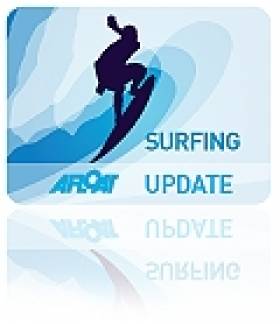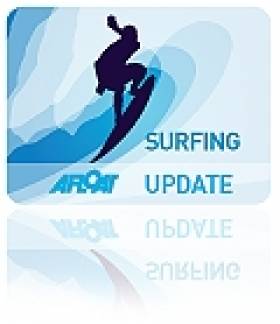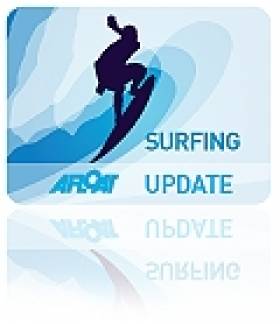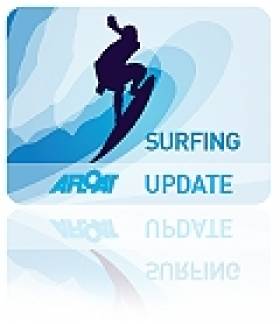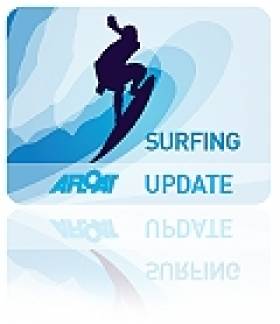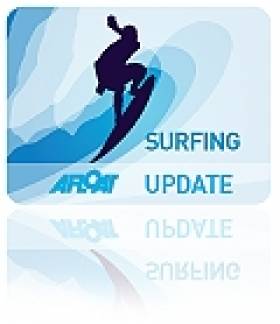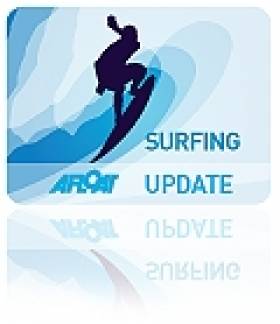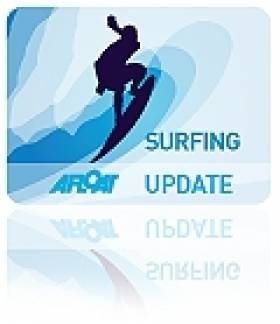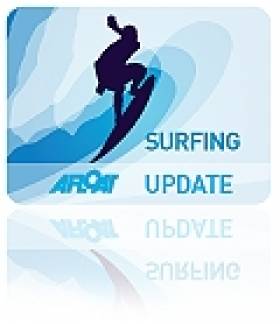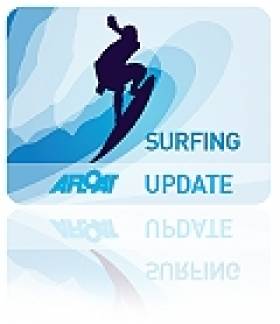Displaying items by tag: Surfing
Women of All Ages Learn Surfing in Lahinch
#surfing – Surfing, yoga, belly dancing: it's time to head for the beach and dip your toes in the sea! Lahinch will be heating up as host town to hundreds of women at Mermaids, the Irish Surfing Association's national women's weekend, on the 14/15th June.
The Mermaids weekend is an opportunity to learn to surf - or to improve your skills - under the watchful eyes of some of Ireland's top female surfers. Skilled female surf instructors, alongside past and present female members of the Irish Surf team, will give participants a fun, safe and inspirational surfing experience.
Mermaids is a surfing weekend that provides women (and girls) with an opportunity to meet and share information and advice on surfing while introducing newcomers to the sport in an all female environment. The event brings women of all ages and surfing abilities together in a celebration of women's surfing in Ireland. Whether you are 8 or 80 - if you are interested in surfing, this is an opportunity to learn more!
The weekend is about learning, inspiring others and sharing your excitement and enthusiasm for surfing. Everyone is encouraged to enjoy their time in the water whilst also learning about surfing technique and water safety. Out of the water, new friendships are made and surf stories are shared during the beach lunch, yoga, belly dancing and night time entertainment.
Activities include surfing lessons and coaching (equipment provided); talks on all aspects of surfing; yoga; beach lunch; and belly dancing! There is no requirement to book, just turn up. Attend the full weekend, one day or half a day. Registration between 9am and 3pm on Saturday (last surfing lesson going into the water at 3pm) and 10am-2.00pm (last lesson going into the water at 2pm) on Sunday.
Mermaids is hosted under the Women in Sport Initiative, run by the Irish Sports Council, to encourage more Irish women to participate in sport.
#Surfing - We've featured surfing dogs on Afloat.ie before, but this video from half-way round the world shows a new champion waveriding pooch with an Irish pedigree.
As The Asahi Shimbun reports, Pinocchio - or Pino for short - is a six-year-old male Irish setter from Kanagawa, Japan who's taken first prize in the animal class of a national surfing contest for four years running.
Once he gets a push-off on his owner Kazuhiro Tsukahara's specially adapted stand-up paddle board, with extra grip for doggy paws, Pino flies solo on the waves alongside his human counterparts, much to the amazement of onlookers.
The Asahi Shimbun has more on the story HERE.
#Surfing - Organisers of the 2014 Sea Sessions Surf and Music Festival have just announced details of their programme for 27-29 June.
Joining a number of top music acts will be some of the best competitors on the international circuit for Ireland’s 'biggest beach party of the year', which proved a big draw to the Donegal surfing hotspot last year.
The Sea Sessions Expression Session is returning in 2014 with the cream of European performance surfing taking on the best in Ireland.
The event format as usual is 'best move/air' and is organised in a way to allow the surfers to express themselves and push their performance.
“It is a really spectator-friendly format”, said organiser Pete Craig. “Most surf events are quote technical and not really that engaging for non-surfers. This unique format allows for and encourages explosive surfing that everyone can get.”
The competitors will hail from places such as France, Spain, Portugal, the Caribbean, the UK and Ireland.
William Alotti (Saint Martin) is returning to defend his title and is an early favourite. Toby Donachie (UK), who was one of the standout performers last year with some huge boosts, is also returning to challenge Alotti for a total prize pot of €3000.
Noah Lane (AUS) was the dark horse of the event last year, and after having settled in Bundoran, he may have some local knowledge that could aid him this year.
New for 2014 is the Malin Waters Fish Challenge, which will see a selection of local surfers and traveling pros attack the waves in some old-school shapes that have been selected for the event.
On the music side, top international talent will be joining the crème de la crème of Irish acts this year at Sea Sessions with Kelis, The Strypes and The Dandy Warhols all set to perform in Bundoran.
The full music line-up and festive activities can be found at www.SeaSessions.com.
#Surfing - The third annual Long Line Disabled Surf Festival will take place at Limavady's Benone Strand on Saturday 14 June, according to the Londonderry Sentinel.
Afloat.ie previously reported on the inaugural event hosted by the Long Line Surf School in the North Co Derry town, which brought together more than 30 people with disabilities aged from eight to 25, many of whom were trying out surfing for the first time.
Long Line's Dan Lavery says confidence is the key to enjoying surfing, whatever one's differing abilities or experience level - so everyone taking part will have at least one volunteer lifeguard or surf instructor on hand to help them catch the waves.
The Londonderry Sentinel has more on the story HERE.
#Surfing - Looking for somewhere to hit the waves as summer's sunny days loom on the horizon?
IrishCentral has got you covered with some spectacular videos of Ireland's top surfing spots.
From the Causeway Coast to the big wave haunts of Donegal and Sligo and the more hidden surfing hubs of the East Coast, there's a spot for surfers of all skill levels.
NI Surfers Wanted To Help Break Unique World Record
#Surfing - The Belfast Telegraph reports that surfers across Northern Ireland are being sought to help break a unique surfing world record later this year.
Portrush surf school proprietor Carl Russell is planning the bid to set a new record for the most people standing on the same wave at the same time - currently standing at 110 surfers, set in South Africa in 2009.
Stability will be crucial to the challenge, so only surfers of intermediate level up need apply.
But with surfing becoming such a popular pastime around Ireland's coastline, finding enough participants should be less difficult than ever before.
And the record aside, the attempt is a great opportunity to raise funds for the RNLI, following the £600 raised for the lifeboat charity last year.
The Belfast Telegraph has more on the story HERE.
Surfing Rises On Causeway Coast This Easter Weekend
#Surfing - The News Letter has the lowdown on this weekend's Causeway Coast Surf Festival in Portrush.
This marks the second year of the festival, hosted by the Causeway Coast Surf Club, that mixes surfing with beach and street sports plus music, film and photography, with plenty on offer to entertain the whole family over the Easter weekend.
Aside from the action on the water, highlights are set to be screenings from the Shore Shots film festival that wowed Dublin earlier this month, and a collection of classic Volkswagen camper vans.
The News Letter has more on the weekend's events HERE.
Ireland's Top Surfing Spots - In Infographic Form
#Surfing - Do you know the best places to surf in Ireland?
Perhaps you've read our many stories on the brave and bold waveriders at Mullaghmore Head. Or the dangerous surf at Lahinch in Co Clare that caused significant damage in January's storms.
But did you know Portrush in Co Antrim is great for kids just getting started on the waves? Or that some of the best surf for beginners can be found on in West Cork?
That and more can be learned from this fascinating infographic courtesy of the Ocean Sands Hotel in Enniscrone, Co Sligo, which provides hospitality at the heart of the northwest's big wave surfing axis.
Maybe it will teach you something new about Ireland's surfing legacy - and encourage you to take to the waves this summer!

Now It's Wave Rage With Tirade Over Surf Rights in Cornwall
#surfing – 'F*** off back to England you ****!' A surfer who allegedly rode another surfers wave has been racially abused on a Cornish beach by a stand-up paddle boarder (SUP) who appears to consider Cornwall another country.
Longboarder Phil Brown, 29, was subjected to abuse after 'sharing' a wave. The former Army serviceman described it as 'disgusting' and 'inappropriate'.
The Unknown paddle boarder launched into a four-letter tirade at Bude, Cornwall. He told the surfer: 'I will put you in f*****g hospital' if he rode same wave again.
Irish Surfing Intervarsities On Achill Island This Weekend
#Surfing - Students from all over Ireland will be taking to the waves off Achill Island for this weekend's Irish Surfing Intervarsities, as the Mayo Advertiser reports.
Keel Beach will be the venue for the two-day contest that kicks off tomorrow Saturday 22 March, and will see top wave riders from 11 institutions show their stuff in the surf - while organisers promise a party atmosphere for spectators on land. The Mayo Advertiser has more on the sorry HERE.
In other surfing news, Mullaghmore in Co Sligo will host the third annual Conference in Surfing Medicine this coming September.
According to Surfer Today, the gathering to be convened by the European Association of Surfing Doctors on 9-13 September will discuss the dangers posed by the increasingly extreme surf at one of the world's premier big wave spots.
Peter Conroy will be among those speaking during the week, giving the surfer's perspective on surfing in the harshest of conditions.


























